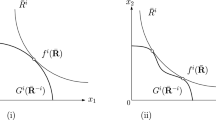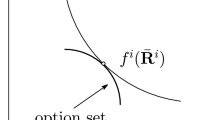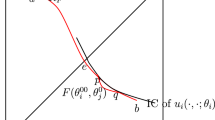Abstract
We show that strategy-proof allocation mechanisms for economies with public goods are dictatorial—i.e., they always select an allocation in their range that maximizes the welfare of the same single individual (the dictator). Further, strategy-proof and efficient allocation mechanisms are strongly dictatorial—i.e., they select the dictator’s preferred allocation on the entire feasible set. Thus, our results reveal the extent to which the conflict between individual incentives and other properties that may be deemed desirable (e.g., fairness, equal treatment, distributive justice) pervades resource allocation problems.
Similar content being viewed by others
References
Barberà S., Jackson M.: Strategy-proof exchange. Econometrica 63, 51–87 (1995)
Barberà S., Peleg B.: Strategy-proof voting schemes with continuous preferences. Soc Choice Welf 7, 31–38 (1990)
Barberà, S.: Strategy-proof social choice. In: Barcelona GSE Working Paper Num. 40 (2010)
Bergemann D., Morris S.: Robust implementation in direct mechanisms. Rev Econ Stud 76, 1175–1204 (2009)
Deb R., Ohseto S.: Strategy-proof and individually rational social choice functions for public good economies: a note. Econ Theory 14, 685–689 (1999)
Gibbard A.: Manipulation of voting schemes: a general result. Econometrica 41, 587–602 (1973)
Green J., Laffont J.-J.: Characterization of satisfactory mechanisms for the revelation of preferences for public goods. Econometrica 45, 427–438 (1977)
Hurwicz L.: On informationally decentralized systems. In: McGuire, E., Radner, R. (eds) Decisions and Organization, pp. 297–336. North-Holland, Amsterdam (1972)
Hurwicz L., Walker M.: On the generic non-optimality of dominant-strategy allocation mechanisms: a general results that includes pure exchange economies. Econometrica 58, 683–704 (1990)
Ledyard J.: Incomplete information and incentive compatibility. J Econ Theory 18, 171–189 (1978)
Lindahl E.: Just taxation: a positive solution. In: Musgrave, R., Peacock, A. (eds) Classics in the Theory of Public Finance, Macmillan, New York (1964)
Moreno D.: Nonmanipulable decision mechanisms for economic environments. Soc Choice Welf 11, 225–240 (1994)
Moreno D.: Strategy-proof allocation mechanisms for pure public goods economies when preferences are monotonic. Econ Theory 13, 183–197 (1999)
Moreno D., Walker M.: Nonmanipulable voting schemes when participant’s interests are partially decomposable. Soc Choice Welf 8, 221–233 (1991)
Moulin H.: On strategy-proofness and single peakedness. Public Choice 34, 87–97 (1980)
Saijo T.: Incentive compatibility and individual rationality in public good economies. J Econ Theory 55, 203–212 (1991)
Samuelson P.: The pure theory of public expenditure. Rev Econ Stat 36, 387–389 (1954)
Satterthwaite M.: Strategy-proofness and arrow’s conditions: existence and correspondence theorems for voting procedures and social welfare functions. J Econ Theory 35, 1–18 (1975)
Satterthwaite M., Sonnenschein H.: Strategy-proof allocation mechanisms at differentiable points. Rev Econ Stud 48, 587–597 (1981)
Schummer J.: Strategy-proofness versus efficiency for small domains of preferences over public goods. Econ Theory 13, 709–722 (1999)
Serizawa S.: Strategy-proof and individually rational social choice functions for public goods economies. Econ Theory 7, 501–512 (1996)
Serizawa S.: Strategy-proof and symmetric social choice functions for public goods economies. Econometrica 67, 121–145 (1999)
Walker M.: On the nonexistence of a dominant strategy mechanism for making optimal public decision. Econometrica 48, 1521–1540 (1980)
Wilson R.: Game theoretic analysis of trading processes. In: Bewley, T. (ed.) Advances in Economic Theory, Cambridge University Press, Cambridge (1987)
Zhou L.: Impossibility of strategy-proof allocation mechanisms in economies with public goods. Rev Econ Stud 58, 107–119 (1991a)
Zhou L.: Inefficiency of strategy-proof allocation mechanisms in pure exchange economies. Soc Choice Welf 8, 247–254 (1991b)
Author information
Authors and Affiliations
Corresponding author
Additional information
We gratefully acknowledge the comments and suggestions of the editor and referees. (In particular, we thank a referee who suggested a simple argument to deal with the case n > 2 in the proof by induction of Theorems 1 and 2.) We also thank Francisco Marhuenda and Carmelo Núñez for helpful discussion, and Carmen García-Miguel for helping us composing the figures. Financial support from the Spanish Ministry of Education, grants SEJ2007-67436 and Consolider-Ingenio 2010, and from the Comunidad de Madrid, grant Excelecon, is gratefully acknowledged.
Rights and permissions
About this article
Cite this article
Moreno, D., Moscoso, M.J. Strategy-proof allocation mechanisms for economies with public goods. Econ Theory 52, 315–336 (2013). https://doi.org/10.1007/s00199-011-0627-5
Received:
Accepted:
Published:
Issue Date:
DOI: https://doi.org/10.1007/s00199-011-0627-5




